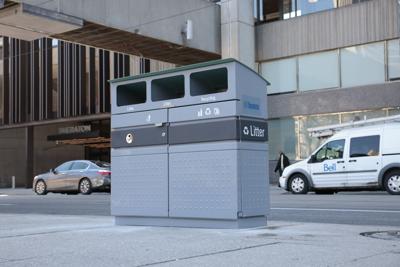It’s Toronto’s dirty little secret, and it leads to a lot of waste.Â
The 10,500 litter bins dotting the city’s sidewalks may have slots labelled “Recycling,” but if you think that the pop cans, coffee lids and cardboard containers dropped into them are being reused, think again.
In fact, less than one per cent of the 5,000 tonnes of refuse deposited in street litter bins every year is actually diverted from the garbage stream, according to city staff. That’s because any recoverable material is either so dirty or mixed in with nonrecyclable items that it’s impractical to extract, and it ends up in landfill.
Staff have acknowledged the vast majority of material in other public recycling bins, such as those in parks, is also treated as garbage.
Among the most common nonrecyclable materials incorrectly placed in public recycling bins are , according to the city.Â
Charlotte Ueta, acting director of policy, planning, and outreach in Toronto’s solid waste management services, conceded that less than one per cent is not an ideal recycling rate.
“We recognize that this is a challenge,” she said. But she stressed that it’s a problem faced by most cities, especially ones like šĢ―ĮÉįĮøđŲÍøthat every year welcomes millions of out-of-towners who may not be familiar with local recycling rules.Â
Still, if it’s a common problem, it’s one that many people walking Toronto’s streets aren’t aware of.Â
Justin Rogers, who dropped a piece of litter into the recycling slot of a bin at Yonge and Dundas Streets on a recent weekday morning, assumed that most of what’s in the receptacles gets reused.Â
“They take it to the recycling depot and they process it and it gets recycled,” he told a reporter when asked where he thinks the material goes.Â
He was surprised to learn so little is diverted. “That’s not good,” said Rogers, a transit operator. “Because we need to take care of the earth. We need to cut down on litter. We don’t want it going into trash and landfills.”
Ellie Eplett said she was hopeful the Tim Hortons cup she dropped in a sidewalk bin on Parliament Street was recycled, but she wasn’t shocked to hear it probably wouldn’t be.Â
“I learned in school the best thing you could do” is to produce less waste in the first place, “because recycling is not like an eraser,” said Eplett, who works in government. “You know a lot of stuff says it’s recyclable, it’s not actually.”
Ashley Wallis, associate director of advocacy group , said “it’s not surprising” that so little of what’s in public bins is recycled, “but it is disappointing.”Â
She said the city shouldn’t shoulder most of the blame, however. Instead, she pointed the finger at a plastics industry that has for decades been telling the public that much of what it makes can be recycled, when in fact it’s often not practical for municipal programs to do so. She cited plastic films and snack packets as examples of items residents might think can be reused, but usually can’t.
“One of the major challenges for municipal recycling for the last probably 10 to 20 years has been that the kinds of materials the producers are putting on the market are much more complicated and challenging to recycle, full stop,” Wallis said.Â
Wallis said that while the people using street bins bear some responsibility for low diversion rates â anyone putting dog poop bags in the recycling compartment isn’t helping â the city does have a role to play. But she’s been encouraged by improved signage šĢ―ĮÉįĮøđŲÍøhas been applying to receptacles in recent years that make it clear what can and can’t go in the bins.Â
Ueta said the city could expand efforts like that. It’s currently working on , to help achieve what the municipality describes as its “aspirational” goal of zero waste.
Staff are scheduled to report back next year on an updated approach, and Ueta said it could include replicating measures the city has been testing in recent years. For instance, in 2021 that could only fit beverage cans and bottles, and carried clear signage about what was accepted. Data showed the lids can help increase the amount of recycling collected in parks.
Ueta doesn’t buy that putting “recycling” labels on sidewalk litter bins amounts to false advertising. Rather than remove the signage, she said the city would prefer to “promote positive behaviour and actually (get) folks utilizing the recycling compartment” properly.
“We want to build on the successes” the city has already had, “and just enhance it with more public education,” she said.Â



























To join the conversation set a first and last name in your user profile.
Sign in or register for free to join the Conversation